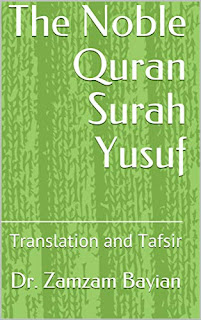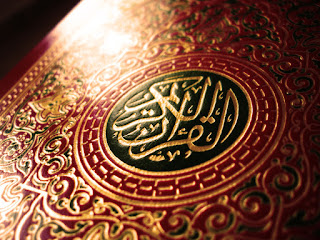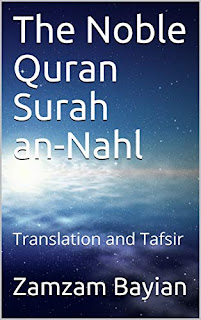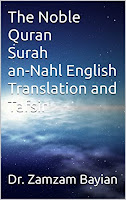The Quran & the Truth
Humanity needs a divine code, guiding them to what brings them happiness and wards off misery in the worldly life and the Hereafter. Therefore, Allah, Exalted is He, revealed the Quran, upholding the truth, and containing the truth.
(Upholding the truth, We have revealed it, and containing the truth, it has been revealed. We have not sent you, but as a giver of good news and a warner.
It is a clear Quran which We have revealed so that you may deliberately recite it to men, and We have revealed it in stages.
Say, ‘Believe or do not believe in it. Indeed, those who were given knowledge before it, when it is recited to them, fall down on their faces prostrating.’
They say, ‘Glory be to our Lord! Indeed, our Lord’s promise must be fulfilled.’
They fall down on their faces weeping, and it increases their humbleness.)
[Quran Surah al-Isra:105-109]
Relationship with the Previous Part
The previous part mentioned that the Quran is inimitable, and that the disbelievers asked Messenger Muhammad to bring them miracles so that they might believe in Islam. If their request was met and then they disbelieved, they would be punished and destroyed. Then the ayat returns to speak about the greatness and sublimity of the Quran.
Tafsir
(Upholding the truth, We have revealed it, and containing the truth, it has been revealed. We have not sent you, but as a giver of good news and a warner.) [105]
(Upholding the truth, We have revealed it.) Allah revealed the Quran to Messenger Muhammad in order to support, uphold, establish, and sanction the truth.
(… and containing the truth, it has been revealed.) The Quran contains the truth in every matter, creed, worship, etc.
Allah revealed the Quran containing proofs of His Oneness, laws and legislation, regulating people’s life, commandments to implement justice and practice virtue ethics, and prohibitions of injustice and vice ethics. In sum, the Quran contains all man needs to know to attain happiness in this world and the Hereafter. Moreover, Allah revealed the Quran and took upon Himself to protect it from distortion, alteration, increase, and decrease.
(We have not sent you, but as a giver of good news, and a warner.)
This is praise for Messenger Muhammad to whom the Quran was revealed.
O Messenger! We have sent you only as a giver of good news to the good doers and a warner to the evil doers. We have not sent you to force people to belief in Islam.
Verily, only Allah is able to guide people to follow the path of guidance.
(It is a clear Quran which We have revealed so that you may deliberately recite it to men, and We have revealed it in stages.) [106]
O Messenger! We have revealed the Quran to you. It is distinctively clear. It precisely states commands, prohibitions, rules, and laws. We have revealed it in stages so that you might deliberately recite it to men.
Reciting the Quran deliberately facilitates understanding and implementing its rules as well as its memorization. The companions of Messenger Muhammad followed this method in learning and memorizing the Quran. For them, it was not only a book they should recite, it was also a road map they should follow to achieve success in this world and the Hereafter.
Abu Abdur-Rahman as-Sulamy said, ‘Those who used to teach us the Quran told us that they used to learn the Quran from Messenger Muhammad. When they learned ten ayat, they would not learn other ayat until they implemented the teachings of the learned ayat. Thus they learned the Quran and implemented its teachings at the same time.’
(We have revealed it in stages.)
Allah revealed the Quran to Messenger Muhammad over a period of twenty-three years in accordance with His wisdom, and events that took place. It was revealed in such a manner to facilitate its understanding and memorization for the Muslims. If they were asked to implement the entire rules and teachings of the Quran at once, it would be difficult for them.
Then Allah threatened the disbelievers, showing their insignificance.
(Say, ‘Believe or do not believe in it. Indeed, those who were given knowledge before it, when it is recited to them, fall down on their faces prostrating.’) [107]
O Messenger! Tell the disbelievers, who refused to believe in Islam, described the Quran as tales of the ancient, and asked for miracles, ‘Do as you like. Believe or disbelieve in the Quran. Your belief will not increase its sublimity, and your disbelief will not decrease its significance. The scholars among the Jews and Christians, who have knowledge of the former divine Scriptures and can distinguish the truth from falsehood, fall down on their faces, prostrating when the Quran is recited to them.’
Those scholars fall down on their faces, prostrating when listening to the recitation of the Quran in order to thank Allah, Who have fulfilled His promise by sending Messenger Muhammad and revealing the Quran as He promised in the former Scriptures.
(…when it is recited to them, fall down on their faces prostrating.)
The conduct of the scholars among the Jews and Christians indicates that their belief was very strong that the effect of listening to the recitation of the Quran immediately appeared through their prostration. They humbly fell down on their faces, prostrating as soon as they listened to the recitation of the Quran.
Falling down on the face is particularly referred to because the face is the first part of the body touches the earth when prostrating, and because it shows humility and submission.
(They say, ‘Glory be to our Lord! Indeed, our Lord’s promise must be fulfilled.’) [108]
When listening to the recitation of the Quran, the scholars among the Jews and Christians say, ‘Glory be to Allah, our Lord. Indeed, His promise must be fulfilled.’
They glorified Allah, as He fulfilled His promise in the Torah and the Gospel that He would send Messenger Muhammad and reveal the Quran, which happened. Indeed, sending Messenger Muhammad as a messenger to invite people to believe in the Oneness of Allah and revealing the Quran, which contains what brings happiness to man in this world and the Hereafter is a great blessing that Allah must be thanked for.
(They fall down on their faces weeping, and it increases their humbleness.) [109]
Praising the scholars among the Jews and Christians is repeated in this ayah, (They fall down on their faces weeping, and it increases their humbleness.) That is because the reason for their falling down on their faces prostrating in this ayah is different from that of ayah [107]
The first prostration was to glorify and thank Allah as He fulfilled His promise by sending Messenger Muhammad and revealing the Quran. As for the second prostration, it was because they were greatly affected by the admonitions and lessons of the Quran.
(They fall down on their faces weeping, and it increases their humbleness.)
The scholars among the Jews and Christians prostrated themselves when listening the Quran, and wept out of submission and humbleness to Allah.
The scholars deduced from ayah [107 &109] that weeping out of fear of Allah indicates true belief, and purity of the soul. Messenger Muhammad said, ‘Two eyes shall never be touched by the hellfire. They are an eye that cried out of fear of Allah, and an eye that spends the night guarding the borders for the sake of Allah.’
Learned Lessons
• Allah, Exalted is He, revealed the Quran, upholding and containing the truth.
• The Quran was revealed in stages over a period of twenty-three years in order to facilitate its recitation, understanding, memorization and implementing its rules and teachings. Otherwise, it might be difficult for people to comprehend and implement its teachings.
• Allah, Exalted is He, threatened the disbelievers, who disbelieved in the Quran. He mentioned that the scholars among the Jews and Christians believed in the Quran. They would fall down on their faces prostrating when listening to the recitation of the Quran in order to glorify and thank Allah, who fulfilled His promise by sending Messenger Muhammad and revealing the Quran. In addition, they showed their submission and humbleness to Allah by their prostration.
• Crying for fear of Allah indicates strong faith, and fear of Allah.



















